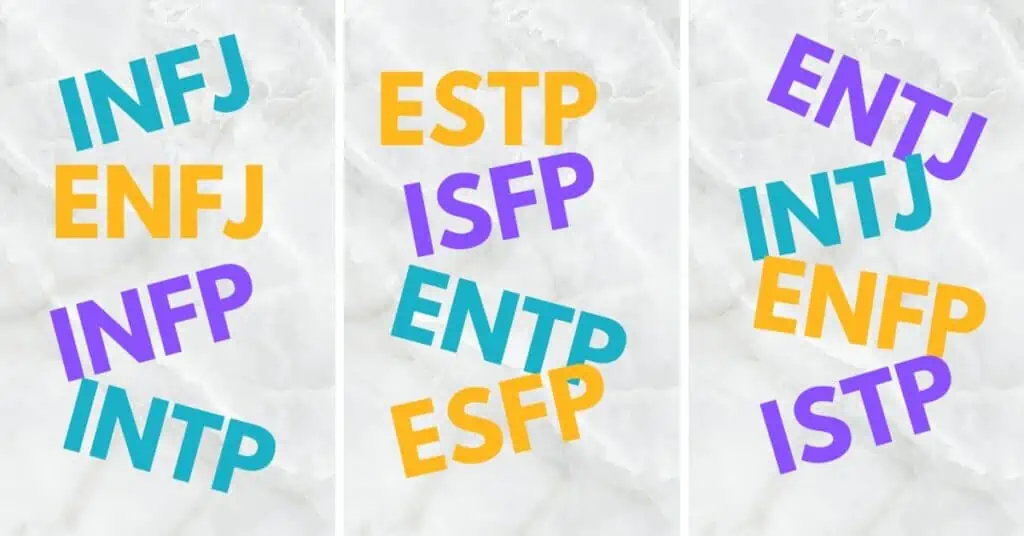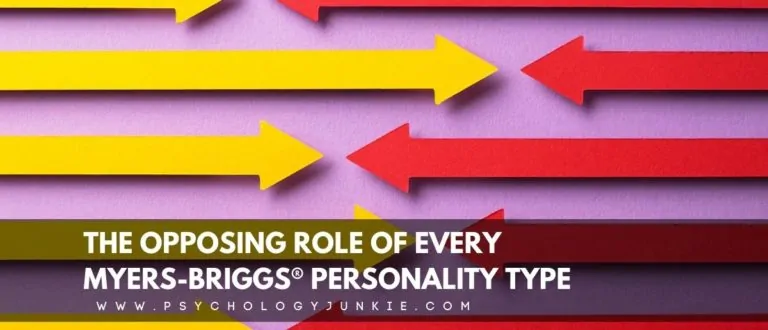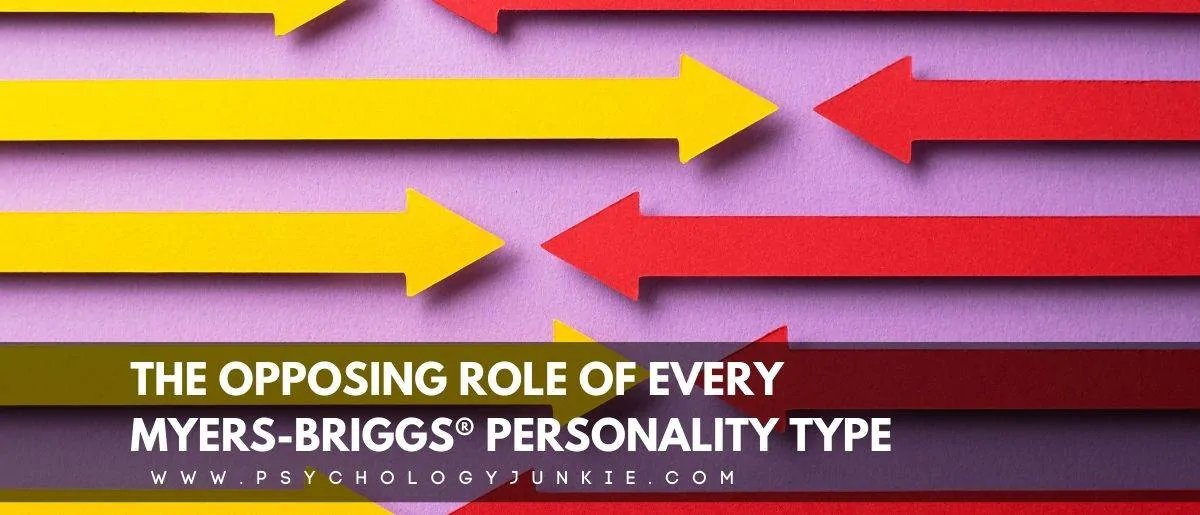The Totally Normal Thing You Can’t Stand, Based On Your Myers-Briggs® Personality Type
We’ve all been there. One minute you’re feeling fine and clear-headed and then the next minute someone is talking about something very basic and everyday, but you want to run away or scream or both. You feel silly for being so annoyed by something so seemingly insignificant and wonder why you are so uncomfortable in the first place.
The answer? It could have something to do with your Myers-Briggs personality type.

The Myers-Briggs Type Indicator (MBTI®) is a classification system that helps people to understand their personalities and strengths better. Each of the 16 types has particular tendencies, sensitivities, and weaknesses that can leave them feeling stressed or uncomfortable in certain situations that others are perfectly fine with. That’s what we’re going to explore in today’s article!
Not sure what your personality type is? Take our new personality questionnaire here. Or you can take the official MBTI® here.
The Totally Normal Thing That You Can’t Stand, Based On Your Myers-Briggs® Personality Type
INFJ
You know it shouldn’t bother you as much as it does, but you hate the feeling you get when you’re in a room with bright, fluorescent lights. Suddenly every harsh detail around you sticks out like a sore thumb and you can’t retreat into your mind as easily because the world feels like it’s literally buzzing around you. As someone with inferior Extraverted Sensation, you like your surroundings to be tranquil and quiet; both audibly and visually. Ideally, every room you inhabit would be filled with the warm glow of a fireplace and every wall would be lined with bookshelves filled to the brim to overflowing.
You need to feel like some part of you can retreat into the darkness wherever you are; whether that means a cozy nook nobody is aware of, a couch with a fleecy throw blanket you can snuggle under, or dim lights that give you the slight sensation of having privacy. But fluorescent lights harshly remind you that you are “out there”, exposed, and highly over-stimulated.
Find out more about INFJs: How INFJs Say “I Love You”
INTJ
You know that chit-chat and small talk are a necessary part of life. You know that when you greet your co-worker or neighbor you should ask them how their day is going and really listen to them explain about their toe fungus, the drizzly weather, or their fantasy football team. But for some reason, it feels like your throat is closing up when you try to say “Hey! How’s it going?”. When you’re stuck in a conversation about the latest gossip or what somebody ate for lunch, you can feel your patience slowly evaporating into clenched fists and gritted teeth. As you try to keep your face from hiding your complete and utter lack of mental stimulation, you start breaking out into a cold sweat. You don’t want to be a jerk. You try to find some big-picture meaning behind your neighbor’s debilitating toe fungus, but you find your eyes slowly reverting to “death glare” and your neighbor/co-worker/boss backing away cautiously.
Don’t worry! You’re not a robot with no capacity for pleasantries. Your introverted intuition just needs to feel that it’s time is being spent on deeper and more big-picture ideas and theories than your neighbor’s unfortunate yellow toenail. Find someone with a cause that needs solving or something to debate, and you’ll immediately perk up and feel more at home.
Find out more about INTJs: The Childhood Struggles of INTJs
ISFP
You know “niceness” is important in the world and generosity and tact should be admired. But all too often you feel like people, whether they’re acquaintances or close friends, need to be nice just for the sake of being admired. Some people are hiding behind a mask of agreeable platitudes, when really they don’t believe any of it or care at all. Simply being in the presence of these people can put you in a state of agitation because…well…who even are they? What do they stand for? What do they value? If you can zone out and drift into your own thoughts you’re okay, but if you’re forced into a conversation with someone who seems like they’re playing a part, you feel squirmy and awkward.
You feel more at ease when you can be around people who are willing to show their flaws, weaknesses, and honest thoughts on a variety of topics. You don’t want to be surrounded by robots, spouting off the same polite phrases; you want people who are willing to reveal their truth, even if it’s not always the most popular opinion.
Find out more about ISFPs: 10 Things That Excite the ISFP Personality Type
ISTP
Some people love heart-to-heart conversations. The idea of opening up that deep well of emotions and allowing it to pour out, to be heard and seen, is cathartic and beautiful. But for you, this exercise can feel like entering a minefield. One wrong move and you could be in the middle of a tear-infested emotional disaster. Queue the cold sweat, the heart racing, and the rapid attempt to plot an escape route out of this situation.
You have deep emotions, sure. But being put on-the-spot about them, not knowing which ones are going to be triggered (or, conversely, you will trigger) can feel like slow torture. But, alas, these conversations are bound to happen and are even *gulp* essential in a healthy relationship. What do you do?
Take it slow. Don’t feel like you have to share every single thought and feeling that crosses your mind at the moment. Focus on active listening; often, people sharing their emotions want someone to really hear what’s on their heart more than they want to get advice. Re-phrase what you’ve heard to make sure you have an accurate understanding of what the other person said (this also gives you brownie points for making the other person feel truly heard). Remember that your emotions matter, and even if it’s difficult to talk about them, it can help you gain a closer relationship with your partner/friend/family member.
Find out more about ISTPs: The Top 7 Gift Ideas for ISTPs
ISFJ
Some people enjoy having someone come to their home and clean things up, make things organized, and otherwise “spruce up” the living space. Unfortunately, ISFJs are not typically among those people! As an ISFJ, it can be uncomfortable and even stressful when someone comes over to your home and starts cleaning, reorganizing, or making changes without asking first.
You like having a place where you feel safe; you have a specific place for everything and a reason for that place, even if others don’t realize it. And if your place is a mess and you don’t have a place for things, you like dealing with your objects personally. Having someone root through your things can feel like having someone root through your underwear drawer – while it might be seen as “helpful” to some people, it often feels invasive to you.
This is where the art of boundary-setting comes in. It can feel awkward and mean to put boundaries up, but if you do it with a smile and a general aura of warmth (not hard for you typically) you can let people know when it’s okay to come in and help and when it’s not. The more comfortable you are setting these boundaries, the less stressed you’ll be in your own home.
Find out more about ISFJs: 24 Signs That You’re an ISFJ, the Protector Personality Type
ISTJ
Lots of people love surprises – they break up the monotony, amp up excitement, and bring variety and spice to life. Unless you’re an ISTJ. Now I’m not saying ISTJs hate all surprises; waking up to a million dollars in the bank or breakfast in bed would probably be a pleasant surprise. But more often than not, ISTJs find surprises uncomfortable and even stressful.
The reason for this is simple: ISTJs are creatures of habit. They like having an established routine and a plan for their day – knowing what to expect allows them to have mental freedom. When the world outside is organized and structured, the world inside is free to explore, create, and ponder. But when the outside environment is chaotic and unpredictable – like when a surprise comes in – it can be stressful for an ISTJ to adjust and remain calm. This is especially true for surprise parties. An ISTJ’s definition of hell would probably be to come home expecting a peaceful routine, only to find a crowd of faces popping out of the darkness with unexpected, startling noises.
You might also like: Here’s the Productivity Hack You Need, Based On Your Myers-Briggs® Personality Type
INFP
As an INFP it takes a lot of effort and even vulnerability for you to express your thoughts, opinions, and experiences. You’re an introvert who feels very deeply, and often feels very guarded about expressing your emotions. And when you do finally air your thoughts or feelings, simple succinct phrases evade you. Therefore, when you spill out your heart or soul to someone and they give you a “Yeah, nice” or other brief response, you immediately feel like digging a hole and burying yourself in it. You braced yourself, gathered your willpower, and took a leap of faith to open up, and this was the response you get?
You don’t mind when people disagree with you – in fact that’s often what spurs interesting conversations. You just want to actually feel heard when you do actually express yourself – which, let’s face it, as an introvert isn’t all that often. What makes you most uncomfortable and stressed is when you feel like your feeling are not being taken seriously or respected. When you pour out five paragraphs about your feelings, and your listener gives you two or three words in response. Just remember, even if the response isn’t what you had hoped for, your thoughts still matter and it took guts to speak them. Don’t put a seal on your lips just yet. Keep putting yourself out there, and you’ll find people who will listen with an open heart and mind. If there’s no one to share your feelings with, journal them. Writing them out can help provide relief when you’re feeling overwhelmed.
You might also like: Are INFPs Empaths?
INTP
You love absorbing information and gathering data from various sources, so anyone would think you love reading the news. Right? Wrong (with exceptions). Many news headlines are tailor-made to spark outrage, offense, or intense emotion. When you dig into an outrage-driven headline, you often spot inconsistencies, exaggerations, and value-judgments that have no place in objective reporting. This often leads to a deep feeling of stress and discomfort, as you see information being distorted and presented with a clear agenda or bias.
It’s not just the news that can leave you feeling uncomfortable and stressed – anything that involves personal attacks or mud-slinging is bound to make your blood boil. You don’t mind debating an issue or exchanging ideas, but when people stoop to dramatic exaggerations and twisting information so that it’s so far out of context it’s barely recognizable, your patience runs thin. When confronted with emotional rants and outbursts, you become even more stressed – logical debates are your comfortable zone, not when people get fired up and refuse to stick to the truth.
You might also enjoy: Your Skills of Persuasion, Based On Your Myers-Briggs® Personality Type
ENFJ
You go out of your way to create connection and camaraderie with the people around you. This takes finesse, empathy, and a genuine interest in the other person’s life. Often this involves asking people how their day was or how their life is going. When people answer with an “eh, you know” or “same old, same old” response, you have to hold back an eye roll. A) You don’t know. B) What even is “same” for them? This person may even want you to drag things out of them, but they’re leaving all the work up to you.
You hate the “annoying, intrusive extrovert” trope as much as the next extrovert. As an ENFJ you are naturally attuned to what makes people feel safe and comfortable, meaning the last thing you want to do is push yourself on someone. If someone doesn’t want to talk, fine. But these “non-answer answers” can leave you feeling a little deflated and annoyed.
You might also like: Here’s What You Hated About High School, Based On Your Myers-Briggs® Personality Type
ENTJ
All intuitives like brainstorming, right? Welllll…..if everyone hashed out effective brainstorms that landed like lightning bolts, this world would be in a much better place. Unfortunately, most brainstorming sessions feel like a bunch of people throwing around darts blindfolded and then acting surprised or offended when you (the ENTJ) says their idea “missed.” You would much rather everyone focus their energy on one idea and take it in a realistic direction that leads to actionable results.
When someone throws out an idea or suggestion that they’ve obviously not thought through, you can feel your blood pressure rising. It’s not just the lack of thought – it’s seeing people putting effort into something and going nowhere with it. This often leads to frustration and stress, as you have to expend time and energy explaining why an idea won’t work, or worse yet – having to enter emotional territory and force an apology when your criticism of said idea hits on a nerve. There are times when brainstorming sparks some great ideas, but it can also veer off the rails quickly if everyone’s not focused and on the same page.
ESFJ
A lot of people talk about how much you like hosting. You get it. You are the “arranger”, the “planner”, the “supporter.” But sometimes even you need a break. Sometimes when you’re in a social gathering and everyone’s standing around tongue-tied, shuffling their carrot sticks around on their plates, you don’t want to be the one to break the ice. Sometimes you don’t want to be the one washing the dishes and sweeping up the crumbs after everyone leaves the party at your house.
Sometimes you want to kick your feet back on a couch in someone else’s home, eat cookies they made, and listen to conversation you didn’t have to orchestrate or facilitate. You want to take a deep breath and just be a guest, but often those occasions seem few and far between. People have come to rely on you and you don’t mind it most of the time, but sometimes you wish people would return the favor.
ESTJ
Something you value intrinsically as an ESTJ is hard work, motivation, and responsibility. Nothing gets under your skin like people who don’t toe the line. For many decades, going above and beyond was the ideal – doing your absolute best without excuses. Now you find yourself engaging with people – people you do, in fact, like – and hearing them throw around terms like “quiet quitting” or calling in “sick” when they’re not, in fact, sick.
You know that, in the words of Bob Dylan, “times they are a-changin’,” but you can’t help but feel weirdly betrayed when those around you don’t take their responsibilities seriously. It’s hard to watch people let things slide without trying to make them right, and it often leaves you feeling exasperated and frustrated. But you don’t want to be a buzzkill, an ESTJ dictator stereotype, or be seen as lacking in empathy. Sometimes you call it out, other times you just feel a weird twinge of annoyance and try to move on.
ENFP
You’re an extrovert, so you should love text messages, right? Especially long, drawn-out text messages that are popping up frequently from the same person? Well…this is where things get less nuanced. As an ENFP, yes, you enjoy heart-to-heart conversations with your favorite people. At the same time, you have a great need for personal freedom. When you’re continually being asked to respond to messages, your first instinct is often to go dark and take a break.
Continuous messages from the same person feel like an obligation, like someone is always watching or waiting for a response. If you’ve come to an agreement with this person that you may respond right away or five years later, then cool. But often there’s an unwritten expectation of speed and immediacy, and that feels like a lot of pressure. It’s hard to be your natural, spontaneous self when someone is monitoring the time between your responses. You’d much rather text when the inspiration hits than feel trapped in a texting exchange.
You might also like: Insecurity and Your Myers-Briggs® Personality Type
ENTP
Being in pristine surroundings is a draw to a lot of people. They love immaculate houses, minimal objects, and snowy white carpets or rugs. But for an ENTP, this can often be a form of torture – yes, torture. Being surrounded by too much order feels suffocating and soulless. You don’t want to live in disarray but you also don’t want to live in terror that you might brush against a wall and leave a speck of dust glaring from the corner of your eye.
You’d much rather have things that feel lived-in, things that tell stories. You want to see some form of character, possibility, or room for inspiration in your environment. You want a home that feels like it’s lived in and enjoyed – not one that looks straight out of an IKEA catalogue. This is especially true if you live with someone who is a neat freak; you often feel like your ideas and creativity are stifled in an overly sterile environment.
ESFP
Just like anyone, you love a good daydream. A few minutes of fantasizing can often be a great escape from the mundanity of everyday life. But, unlike others, you’re more connected to your environment and opportunities available to you in the present. When you spend your time around people who throw around epic fantasies and “wouldn’t it be better if the world was more like my ideals?” monologues, you can feel bored and restless. Either do something to change the world or enjoy what is available now! At least, that’s how your mind tends to work.
To an ESFP, it’s all about the hands-on experience and reality of the moment. You want to make things happen today – not wait for them to come around in some idealistic future. When your peers start talking about pipe dreams that have no chance of materializing, you often feel a wave of stress wash over you. You prefer to stay in the present and enjoy life while looking towards the future with excitement and hope – not hopelessness or always looking for something better and more utopian.
ESTP
A lot of people love the idea of security, routine, and a home that they are always near. People say “there’s no place like home” or try to store up security so they can live in comfort and familiarity until the end of their days. This idea might sound nice to you for a little while…until you’re stuck in one place for just a little too long, and then you start to lose your mind. As an ESTP, you have a hard time staying put, so while the idea of having a home base may sound nice, the reality of never leaving it is anything but.
You need to keep exploring and experience new sights, sounds, and people in order to stay stimulated. When you don’t have something or somewhere new to venture off to, your energy starts to drop and stress levels rise. If you’re stuck in your home or office for too long, you start to feel that familiar wave of restlessness and a need to break out of your routine. Don’t worry though – just plan a quick weekend getaway or a 15-minute drive down a road you’ve never been and you’ll shake off that feeling of stagnation – at least for a little while.
You might also like: Here’s What Makes You Feel Vulnerable, Based On Your Myers-Briggs® Personality Type
What Are Your Thoughts?
Did you enjoy this article? Do you agree or disagree? Let us and other readers know in the comments! Learn even more about your personality type in our eBooks, Discovering You: Unlocking the Power of Personality Type, The INFJ – Understanding the Mystic, The INTJ – Understanding the Strategist, and The INFP – Understanding the Dreamer. You can also connect with me via Facebook, Instagram, or Twitter!
















As an INTP I’ve never understood why others must be so contemptuous of those who never did anything to them. I could understand if person X shot your dog and stole your lunch money, but gossiping about how he walks/talks/chews gum is just petty and nonsensical, and it says more about the person speaking than anyone else. I myself have been subjected this kind of dislike for most of my life (I once asked a girl in 7th grade why she didn’t like me and she replied, “‘Cause you were born!”) and I’m much more likely to defend someone else (in my mind at least) in the crosshairs of the town gossip. Get a life and pick a real problem to complain about.
Why do people do that? Envy, vanity, same old tribalism… I’m with you there, gossiping doesn’t speak highly of the person doing the gossiping.
The INFJ one isn’t me and I’m an INFJ, I honestly don’t mind lights. It’s sound that annoys me.
This seems to refer to HSPs rather than INFJs specifically. Many INFJs (an other types) are HSPs but as you say, not each of them is sensitive about the same sensory stimuli.
ISFJ here, and completely relating to the ISFJ description. I have a friend helping me to downsize from a house to an apartment, and she’s been convincing me to discard things that I’d never dream of discarding, but because of my auxiliary Fe, I usually defer to her suggestions. The last straw was when she convinced me to trash an old trivet that had been passed down from my late grandmother, so moving forward, I’ll insist on finalizing my keep/toss decisions when she’s not around.
The INFP and the ESFP would kill each other… (with eyerolls and death glares, but still)
I’m supposed to be INFP, but my two major irritants are overly bright lights (especially humming fluorescents, which I despise) and being interrupted when I’m telling a story. Yes, I may be long-winded, but if you let me finish, you’ll see that it’s a good story.
This one is super accurate, indeed it hurts INFP’s feelings when these feelings aren’t acknowledged or validated. It’s not easy for us to express our feelings outwardly, but I guess when someone doesn’t know us (and how quiet and private we usually are), they can take our soul expression for granted. I guess the advice is to not take that personally (even our best friends might be sometimes too preoccupied to hear us out), and not expect too much of strangers.
Never open up to strangers…. Right up there with don’t feed bears in your own neighborhood.
I’m amused by the ISFJ one as it’s every bit my nurturing, unconsciously picky mother. We’ve actually had these conversations. Well done!
My INFJ self is always”tasting” the atmosphere of a room (even empty) and I’m known to comment on the quality of the lighting (or more often lack thereof). I’ll revisit restaurants because of the ambiance, of which lighting is no small part. Notably, I don’t like the hum of fluorescents. I will add that another poster mentioned sounds being an issue and I agree that I will get overwhelmed by obnoxiously loud and/or abrasive sounds more quickly than most other sensory inputs.